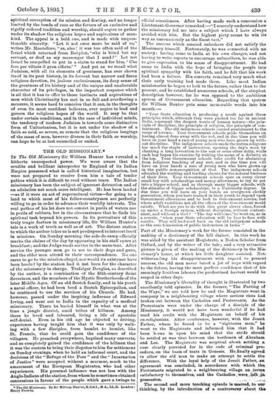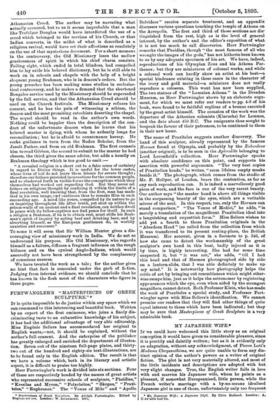THE OLD MISSIONARY.*
IN The Old Missionary Sir William Hunter has revealed a hitherto unsuspected power. We were aware that the
erudite and brilliant interpreter to England of its Indian Empire possessed what is called historical imagination, but were not prepared to receive from him a tale of tender pathos which it is difficult to read without tears. The Indian missionary has been the subject of ignorant detraction and of an adulation not much more intelligent. He has been lauded —as if it were an act of supernatural virtue—for going to a land to which most of his fellow-countrymen are perfectly willing to go in order to advance their worldly interests. The real pathos of his lot does not consist in perils of waters nor in perils of robbers, but in the circumstance that he finds his spiritual task beyond his powers. In its portraiture of this truly tragic feature in missionary life, Sir William Hunter's tale is a work of truth as well as of art. The distant station to which the author takes us is not predisposed to interest itself in missions. On Sunday morning the aide-de-camp officially marks the claims of the day by appearing in his staff spars at breakfast; and the Judge reads service in the mess-tent. After service the younger men go to see to their dogs and guns, and the older men attend to their correspondence. No one • cares to go to the mission-chapel, nor would its existence have been heeded by the station had it not been for the character • of the missionary in charge. Trafalgar Douglas, as described by the author, is a combination of the fifth-century Saint Severinus, and the members of the Mystic Brotherhoods of the later Middle Ages. Of an old Scotch family, and in his youth a naval officer, he had been bred a Scotch Episcopalian, and he continued to use the services of his Church. He had, however, passed under the inspiring influence of Edward Irving, and went out to India in the capacity of a medical missionary. There he buried himself in what was at the time a jungle district, amid tribes of hillmen. Among these he lived and laboured, living a life of apostolic self-denial. Even in his old age he objected to driving, -experience having taught him that it was only by walk- ing with a few disciples. from hamlet to hamlet, like St. Francis, that he could gain the confidence of the 'villagers. He preached everywhere, baptised many converts, and so completely gained the confidence of the hillmen that it was the custom to bring their disputes to him for settlement -on Sunday evenings, when he held an informal court, and the decisions of the "Refuge of the Poor" and the "Incarnation of Justice" were accepted without a murmur, mach to the amazement of the European Magistrates, who had other experiences. His personal influence was not lees with the AngIo-Indians of the station, from whom he sometimes obtained concessions in favour of the people which gave a twinge to
• Th. Old Missionary. By Sir William Hunter, K.O.s&I., LA., LL.D. London : Henry Frowde.
official consciences. After having made such a concession a Lieutenant-Governor remarked :—" I scarcely understand how the missionary led me into a subject which I have always avoided with him. But the highest piety seems to win its way as unconsciously as the finest tact."
The success which amazed onlookers did not satisfy the Missionary himself. Fortunately, he was connected with no society ; having come to India at his own charges, and not having to write reports to encourage subscribers, he was able to give expression to his sense of disappointment. He had come to India with the hope of bringing the people into spiritual sympathy with his faith, and he felt that his work had been a failure. His converts remained very much what their early training had made them. Like most Indian missionaries he began to look to the future, rather than to the present, and he established numerous schools, of the simplest description however, for he was opposed to the ambitions system of Government education. Regarding that system Sir William Hunter puts some memorable words into his mouth:—
"Your State education is producing a revolt against three principles which, although they were pushed too far in ancient India, represent the deepest wants of human nature—the prin- ciple of discipline, the principle of religion, the principle of con- tentment. The old indigenous schools carried punishment to the verge of torture. Your Government schools pride themselves on having almost done away with the rod, and in due time you will have on your hand a race of young men who have grown up with- out discipline. The indigenous schools made the native religions too much the staple of instruction, opening the day's work by chanting a long invocation to the sun or some other deity, while each boy began his exercise by writing the name of a divinity at the top. Your Government schools take credit for abstaining from religious teaching of any sort, and in due time you will have on your hands a race of young men who have grown up in the public non-recognition of God. The indigenous schools educated the working and trading classes for the natural business of their lives. Your Government schools spur on every clever small boy with scholarships and money allowances, to try to get into a bigger school, and so through many bigger schools, with the stimulus of bigger scholarships, to a University degree. In due time you will have on your hands an overgrown clerkly generation, whom you have trained in their youth to depend upon Government allowances and to look to Government service, but whose adult ambitions not all the offices of the Government would satisfy. What are you to do with this great clever class, forced. up under a foreign system, without discipline, without content- ment, and without a God ? The day will come,' he went on, as in a reverie, 'when your State education will be face to face with results. They will be forced back on the old indigenous schools as the sure foundation of public instruction in India • "
Part of the Missionary's work for the future consisted in the making of a dictionary of the hill dialect. In this work he
was aided by the assistant Magistrate, a Boden Scholar from Oxford, and by the writer of the tale; and a very attractive picture is given of the making of the dictionary in the Mis- sionary's home, at which his little daughter assisted. Not- withstanding his disappointment with regard. to present success, the old man never bated a jot of hope with regard to the future, having the most perfect coefideuce that of his
seemingly fruitless labours the predestined harvest would be reaped in other days.
The Missionary's liberality of thought is illustrated by two
excellently told episodes. In the former, "The Parting of the Ways," we are told how he and the Magistrate went in company to a neighbouring village where serious riots bad broken out between the Catholics and Protestants. As the Protestants were under the charge of a disciple of the Missionary, it would not have been wonderful if he held
used his credit with the Magistrate on behalf of his co-religionists. After conference, however, with the Jesuit Father, whom he found to be a "righteous man," he
went to the Magistrate and informed him that it 44 been borne in upon his mind that the strife should be settled as was that between the herdsmen of Abrahean and Lot. The Magistrate was sceptical about settling n case clearly provided for in the code of criminal prer.,
cedure, on the basis of texts in Genesis. He, nelly agreed to allow the old man to make an attempt to settle the difference. With the loyal help of the Jesuit Father, an
agreement was concluded, in accordance with which the, Protestants migrated to a neighbouring village. on Ferra* satisfactory to themselves, and the Catholics were; loft ja
possession.
The second and more touching episode is marred, to our ,thinking, by the introduction of a controversy about the
Athanasian Creed. The author may be narrating what actually occurred, but to us it seems improbable that a man like Trafalgar Douglas would have interdicted the use of a creed which belonged to the services of his Church, or that Indian converts, in the midst of what is described as a religious revival, would have set their affections so resolutely on the use of that mysterious document. For a short moment in the controversy, the Old Missionary loses the mellow graciousness of spirit in which his chief charm consists. Failing sight, which ended in total blindess, had compelled him to lay aside his beloved dictionary, but he is still able to work on in schools and chapels with the help of a bright eloquent young Brahman, who is in deacon's orders. But the young preacher has been making some studies in ecclesias- tical controversy, and he makes a demand that the shortened Bengalee service used by the Missionary should be superseded by the full service, and that the Athanasian Creed should be used on the Church festivals. The Missionary refuses his consent, and he has the pain of witnessing a schism, the deacon and the most promising catechists deserting the chapel. The sequel should be read in the author's own words. Nothing could be happier than the description of the con- duct of the unfortunate deacon when he learns that his beloved master is dying, with whom he ardently longs for reconciliation ; but he is afraid to countenance heresy. He seeks guidance in turn from the Boden Scholar, from the Jesuit Fattier, and from an old Brahman. The first counsels him to read Gibbon, the second to submit to the master he had chosen, the third gives the same advice, but adds a homily on Brahman theology which is too good to omit :- "A revealed religion is a short cut to a false sense of certainty in regard to Divine things. It is useful for the lower castes, whose lives of toil do not leave them leisure for severe thought ; therefore our fathers provided incarnations for the common people, and so shadowed forth in visible forms the conceptions which they themselves had worked out regarding God. But they never set fetters on religious thought by confining it within the limits of a final revelation, well knowing that, from the first, man has made God in his own image, :Ind continues thus to remake Him in each succeeding age. A mird like yours, compelled by its nature to go on inquiring throughout life after truth, yet shut up within the prison-walls of an ancient and a final revelation, can neither dwell in peace with its fellow-captives nor find peace for itself. In such a religion a Brahman, if he is to obtain rest, must stifle his Brah- man's spirit of inquiry by eating beef and drinking beer, and by absorbing himself, as the European gentlemen do, in worldly anxieties and successes."
To some it will seem that Sir William Hunter gives a dis- couraging view of missionary work in India. We do not so understand his purpose. His Old Missionary, who regards himself as a failure, diffuses a fragrant influence on the rough hillmen and on the cynical Anglo-Indians, which would assuredly not have been strengthened by the complacency of conscious success.
We have treated the work as a tale ; for the author gives no hint that fact is concealed under the garb of fiction. Judging from internal evidence, we should conclude that he has known in the flesh most of the characters who figure in these pages.







































 Previous page
Previous page